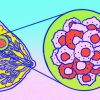
AsianScientist (Jan. 10, 2025) –Breast cancer is more than a single disease. As the most commonly diagnosed cancer in people assigned female at birth, it also manifests through a collection of subtypes—each unique in its molecular pathways and responses to treatments. Understanding their nuances could help scientists design better therapies.
For instance, it is still unclear why nearly half of patients with estrogen receptor (ER)-positive breast cancer—where the circulating hormone can attach to proteins on tumor cells, accelerating their growth—experience relapse after initial treatments with anti-estrogen drugs.
Now, in a new study published in Breast Cancer Research, scientists at National University of Singapore (NUS) found that a protein called Gα13, once thought to drive various cancers, actually slows down ER-positive breast cancer. Their discovery could unlock new strategies for overcoming drug resistance in a subtype that accounts for 80 percent of cases and a large portion of related deaths.
Inside cells, Gα13 typically relays signals from a receptor on the cell surface, activating processes that regulates the cell’s behavior, growth, division and interactions with its environment. While elevated levels of Gα13 have been associated with cancers like ovarian, prostate and triple negative breast cancer, other studies have shown Gα13 can act as a tumor suppressor in B-cell Lymphoma and pancreatic cancer.
Following the hunch that Gα13’s role may vary across different cancers, the research team of the current study found that higher Gα13 levels were linked to improved survival in ER+ breast cancer patients. In the laboratory, experiments in three different ER+ breast cancer cell lines and a mouse model revealed that Gα13 controls cell division, and silencing its gene expression boosted cancer cell proliferation.
RNA sequencing explained that the gene encoding Gα13 helps restrict the activity of MYC—an established oncogene that contributes to therapy resistance in ER+ breast cancer.
“Our findings challenge the previous notion that Gα13 universally promotes cancer growth across different tumor types,” said lead author, Lalitha Subramanyan, a PhD graduate from Duke-NUS and now a postdoctoral fellow at Duke University’s Department of Pharmacology and Cancer Biology. “Instead, we found evidence suggesting that Gα13 may help disrupt harmful pathways in oestrogen receptor-positive breast cancer, potentially slowing or stopping the growth of cancer cells.”
This study offers the first evidence of a protective role of Ga13 in breast cancer. It highlights the intricate and diverse nature of cancer biology and emphasizes the importance of investigating molecular pathways in specific contexts.
“Apart from expanding our understanding of Gα13 and related proteins in cancer formation, our findings also offer a fresh perspective on targeting recurrent ER+ cancers,” said Mei Wang, co-author and associate professor at Duke-NUS’ Cancer and Stem Cell Biology Program.
Looking ahead, the researchers are keen to explore what Ga13 does for other hormone-sensitive cancers.
—
Source: National University of Singapore ; Image: Shelly Liew/Asian Scientist Magazine
The article can be found at GNA13 suppresses proliferation of ER+ breast cancer cells via ERα dependent upregulation of the MYC oncogene.
Disclaimer: This article does not necessarily reflect the views of AsianScientist or its staff.

